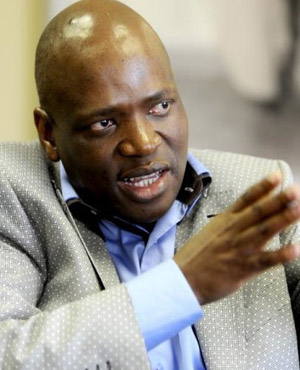
Bloemfontein - It took a joke about SABC chief operating officer Hlaudi Motsoeneng earning more than a Supreme Court of Appeal (SCA) judge to get him to finally crack a smile in court on Friday.
“If you take into account there was a pay increase of 67% [from R1.5 million to R2.4 million] in one year [for] someone who doesn’t have a matric, that is an incredible thing. I mean, it might be as much or even more than what we earn,” said Justice Mahomed Navsa, to laughter from the public gallery.
He wasn’t wrong.
According to the 2013/14 determination by the commission for the remuneration of public office bearers, Motsoeneng’s salary increase would have seen him earning just a bit more than the chief justice and far more than an SCA judge.
But it was understandable that Motsoeneng had really been looking a bit glum up until this point.
The SCA justices – who were hearing the appeal against the interim order of the Western Cape High Court that Motsoeneng be suspended and that disciplinary proceedings pursuant to the Public Protector’s report against him proceed – were bombarding lawyers for the SABC and its board with questions.
The judges were unhappy that this interim order for Motsoeneng’s suspension had come before them, when the main case – about whether his appointment was rational and valid – was less than a month away.
And when it came to the Public Protector’s finding about Motsoeneng’s infamous matric certificate, or lack thereof, the judges did not mince their words.
Justice Visvanathan Ponnan pointed out that he had read “about 1 000 pages and I still don’t know what his highest [school] qualification is”.
When Norman Arendse, appearing for Motsoeneng, later tried to explain that there was an indication of Motsoeneng’s marks in the record, Ponnan said: “Well, on the form of five subjects that he seems to reflect, he says he gave himself grades. He doesn’t set the bar very high, because he gave himself D’s and E’s.”
Arendse then hit back: “Yes, one wonders: how do you defraud somebody when you very modestly give yourself D’s and E’s?”
Navsa added that even Motsoeneng’s own explanation about the circumstances surrounding how he got his job without a matric certificate was “cause for concern”.
But this was, after all, the SCA, where the headwinds blow in all directions.
Anton Katz, the DA’s counsel, faced resistance from the judges about the party’s insistence that Motsoeneng be suspended at a time when all the other lawyers, including his own, seemed to agree that a good middle ground would be for the disciplinary hearing against Motsoeneng to go ahead while putting the suspension on ice.
After all, as Arendse pointed out: “We know, as a matter of fact, that everybody has lived with Mr Motsoeneng since the report came out; there is no reason they can’t live with him for another, however long [the disciplinary hearing] takes.”
The DA’s approach led to Navsa asking: “When you now get two instruments of state agreeing [that the disciplinary should go ahead], then what is this from the DA other than political point-scoring?”
Not even ardent gamblers would willingly speculate on the outcome of an SCA hearing, but one did get the sense that there was a kind of consensus between the judges and advocates about Madonsela’s powers.
It was clear right from the start that the use of the terms “binding” and “nonbinding” to describe the findings and recommendations of the Public Protector was not going to fly. At one point, Judge President Lex Mpati said: “Forget about the term ‘binding’.”
It was also referred to by other judges as “diversionary” and “problematic terminology”.
The definition put up by Advocate Gilbert Marcus, who appeared for the Public Protector, said that a better way of phrasing the limits of the watchdog body’s powers would be to say the Public Protector’s findings “were of legal effect until set aside”, which the judges did not argue with.
Marcus also pointed out that the fact that the Public Protector reports to Parliament “manifestly does not mean that Parliament can interfere with [its] findings”.
Ponnan agreed, saying the Constitutional Court had previously ruled that chapter 9 institutions needed to be manifestly seen to be outside government.
Navsa then explained the problem: “We can’t have a watchdog ... when you have parallel processes and second-guessing. Of course, that doesn’t cut away the possibility of a [court] challenge on legality – but that said, you can’t have parallel processes.”
A person who wanted to be entirely mischievous at this point might begin to speculate about where that leaves the matter of “Pay back the money”.
It did not come up in court at all, but such a mischievous person may very well recall that the Public Protector’s finding that President Jacob Zuma repay a percentage of the money spent on Nkandla – whatever other ministerial processes may have unfolded – has never been set aside by a court.




 Publications
Publications
 Partners
Partners








